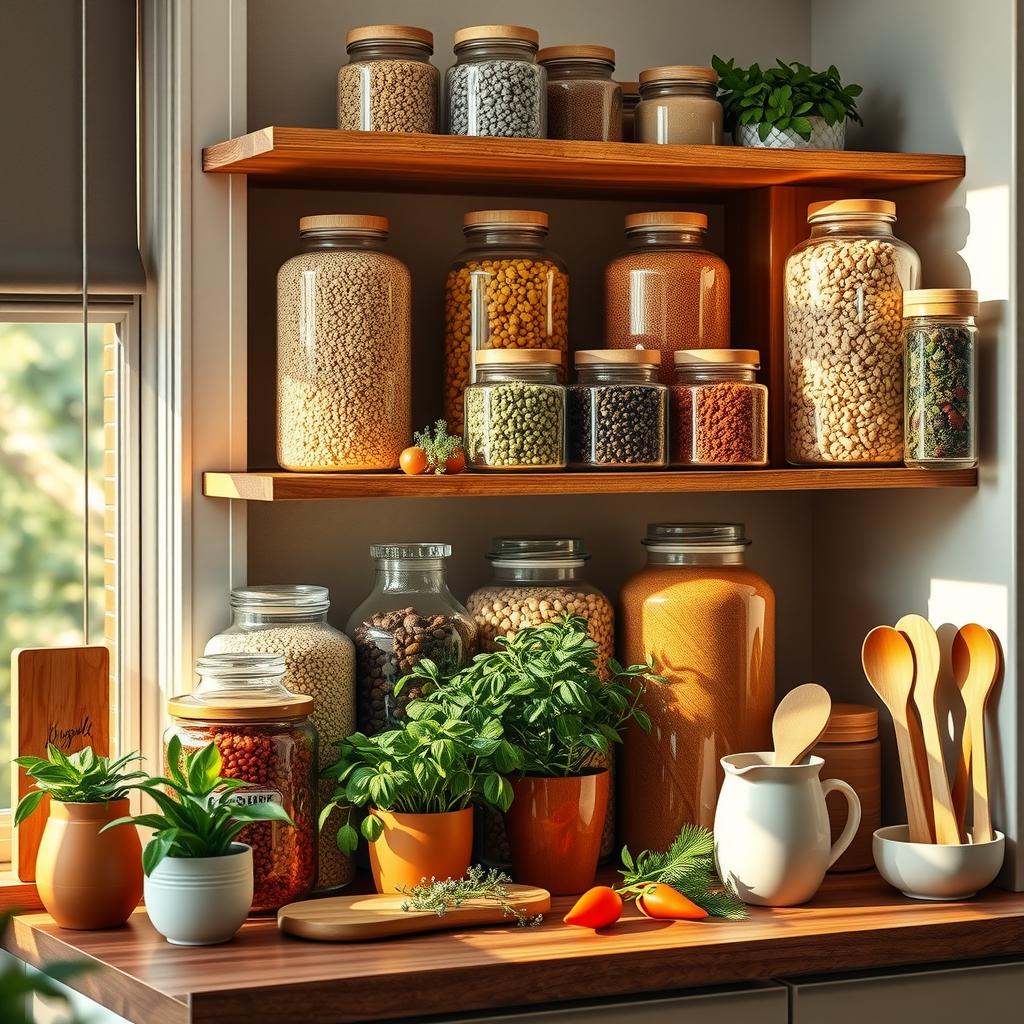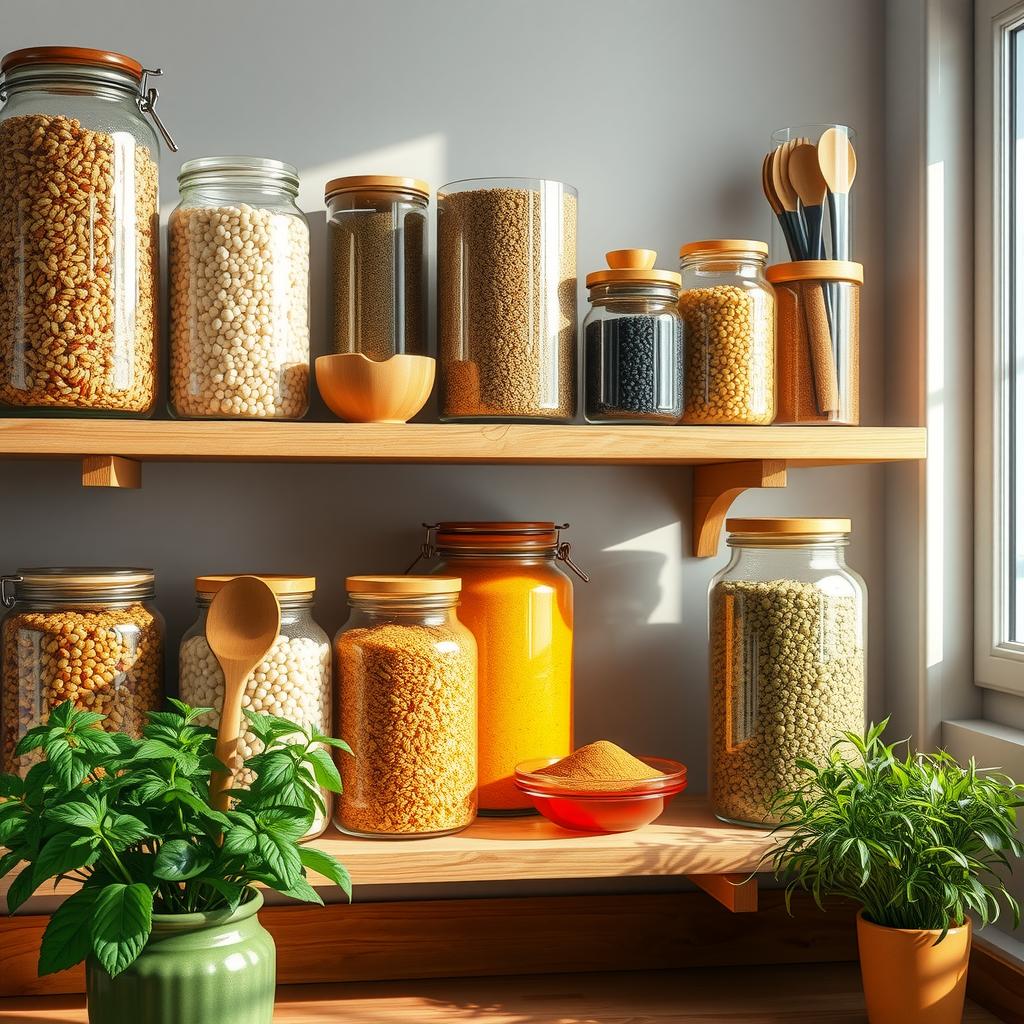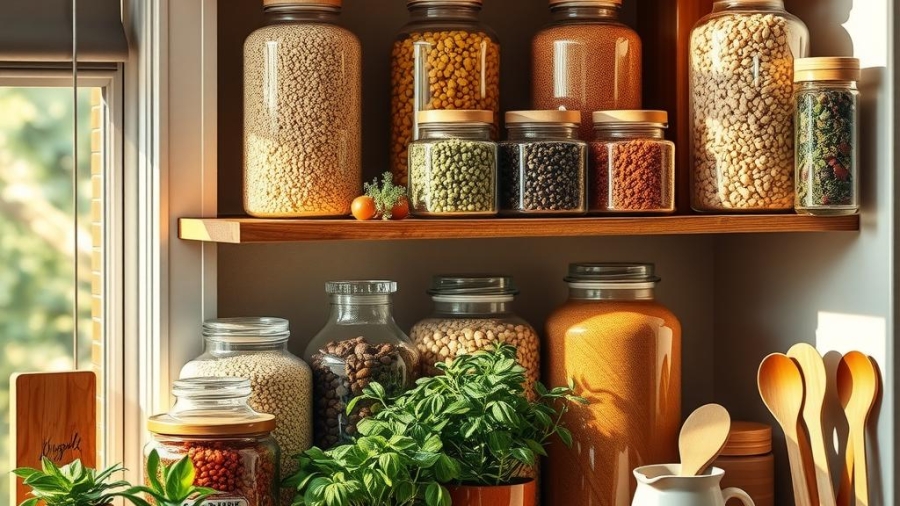In an age where environmental concerns are at the forefront of consumer choices, many individuals find themselves grappling with a pressing question: how can they transform their kitchens into eco-friendly sanctuaries? The kitchen is often seen as the heart of the home, but it can also be a significant source of plastic waste. With countless food storage alternatives flooding the market, transitioning to plastic-free kitchen storage solutions emerges as not just an option but a necessity for those committed to green living and reducing their carbon footprint.
This blog post delves into sustainable solutions that prioritize both functionality and environmental responsibility. Embracing eco-friendly storage options allows one to organize their kitchen while making thoughtful choices about materials and practices that benefit our planet. As we explore various products designed for zero waste lifestyles—such as glass jars, stainless steel containers, and beeswax wraps—it becomes clear that these items not only enhance aesthetic appeal but also provide practical benefits in food preservation.
The core value of this discussion lies in empowering readers with knowledge on how simple changes can yield profound impacts on both personal health and the environment. Adopting a plastic-free approach means opting for durable materials that stand up against wear and tear while being free from harmful chemicals found in traditional plastics. Moreover, by investing in quality food storage alternatives, individuals contribute to reducing single-use plastics burdening landfills.
As this article unfolds, readers will discover actionable insights into selecting effective kitchen storage solutions tailored to individual needs while maintaining ecological integrity. From innovative product recommendations like Bamboo Storage Containers to multipurpose uses of Mason Jars, every suggestion aims at fostering a culture of sustainability within one’s home environment.
So why wait? It’s time for anyone looking toward greener living to take proactive steps towards eliminating plastic from their kitchens—because small changes lead to monumental shifts over time. Join us on this journey towards creating organized spaces filled with sustainable practices; let’s explore together how one can achieve an effortlessly stylish yet environmentally conscious kitchen!

Key Insights:
- Transitioning to Plastic-Free Solutions: Embracing plastic-free alternatives in kitchen storage not only addresses environmental concerns but also fosters a healthier lifestyle. By opting for sustainable solutions, individuals can significantly reduce their contribution to plastic waste while enhancing the functionality of their kitchens.
- Exploring Innovative Storage Options: The market is rich with diverse food storage alternatives, ranging from glass containers that provide airtight seals for leftovers to bamboo and stainless steel bins designed for bulk items. These eco-friendly storage choices allow consumers to organize their kitchens effectively without compromising on sustainability or efficiency.
- Promoting Mindfulness and Food Preservation: Utilizing practical products such as breathable mesh produce bags and reusable beeswax wraps encourages mindful consumption patterns. This shift towards zero waste principles not only maintains food freshness but also plays a crucial role in reducing reliance on single-use plastics, ultimately supporting broader green living initiatives.

Introduction: Understanding the Plastic Problem
Examining the Influence of Kitchen Storage on Plastic Waste
The kitchen is often considered the heart of a home, but it is also a significant contributor to plastic waste. Plastic-free living is becoming increasingly vital in addressing environmental concerns, and kitchen storage plays a pivotal role in this challenge. Traditional food storage options frequently involve single-use plastics that accumulate rapidly, leading to severe ecological consequences. The reliance on items such as plastic wrap, disposable containers, and various other non-biodegradable materials has resulted in alarming levels of pollution that threaten our planet’s health. To combat these issues effectively, individuals must consider adopting sustainable solutions for organizing their kitchens while minimizing their environmental footprint.
In recent years, there has been an escalating awareness surrounding eco-friendly practices within households. By choosing alternative food storage alternatives, one can significantly reduce plastic consumption without sacrificing convenience or efficiency. For instance, glass containers with airtight lids not only preserve food freshness but also eliminate the need for harmful plastics commonly used for food preservation. Additionally, fabric wraps made from organic materials provide an excellent substitute for conventional plastic wrap—offering both functionality and sustainability while promoting a zero-waste lifestyle.
Moreover, embracing eco-friendly storage solutions contributes to creating an organized kitchen environment that fosters green living habits among family members. When families opt for reusable silicone bags or biodegradable containers instead of their plastic counterparts, they set an example for children regarding responsible consumption patterns and environmental stewardship. This shift towards mindful choices extends beyond just individual behavior; it encourages community-wide efforts aimed at reducing overall waste production through collective action.
Transitioning toward more sustainable methods of kitchen organization does not merely address immediate concerns related to waste management; it fosters long-term changes necessary to mitigate climate change impacts effectively. As individuals become more conscious about their purchasing decisions and embrace products designed with minimal environmental impact in mind—such as bamboo utensils or stainless steel cookware—they contribute positively towards building a healthier planet.
Ultimately, understanding how our daily habits contribute significantly to global challenges like plastic pollution serves as motivation for implementing change within personal spaces like kitchens—a critical step toward achieving broader sustainability goals worldwide.
Innovative Eco-Friendly Storage Solutions
Revolutionizing the Kitchen with Sustainable Alternatives
In today’s world, where environmental consciousness is paramount, a growing number of households are seeking sustainable alternatives to traditional kitchen storage. The shift toward a plastic-free kitchen can be seamlessly accomplished by embracing eco-friendly storage solutions that not only enhance organization but also promote a zero-waste lifestyle. A plethora of innovative products designed from natural materials such as bamboo, glass, and stainless steel offer viable food storage alternatives that reduce reliance on single-use plastics. For instance, reusable silicone bags have emerged as an excellent substitute for plastic zip-lock bags; they are durable, versatile, and easy to clean while being completely free of harmful chemicals often found in conventional plastics. Furthermore, glass containers with airtight lids provide an aesthetically pleasing way to store leftovers or bulk items without compromising on safety or sustainability.
Among the many benefits these sustainable solutions bring is their ability to contribute positively towards reducing clutter in the kitchen. Products like stackable food storage containers made from recycled materials allow families to effectively organize their kitchens while minimizing waste. By opting for these green living choices over conventional options, consumers not only support eco-conscious brands but also inspire others within their communities to make similar transitions towards more responsible consumption practices. Additionally, incorporating bamboo drawer dividers can help maintain orderliness in utensil drawers; this renewable resource offers strength and durability while aligning perfectly with the ethos of a plastic-free lifestyle.
Functional Design Meets Eco-Conscious Living
Embracing Stylish Organization through Sustainable Choices
The design aspect of eco-friendly kitchen storage cannot be overlooked; it plays a crucial role in encouraging people to adopt greener habits without sacrificing functionality or style. Sleek stainless steel bins come equipped with clear labeling systems that facilitate easy access and visibility—perfect for organizing pantry staples such as grains and spices! These containers exemplify how modern design principles can harmonize with sustainable living efforts by providing practical yet chic options tailored for contemporary kitchens striving towards minimalism. Moreover, fabric produce bags made from organic cotton present another opportunity for individuals keen on maintaining freshness without contributing further waste; they’re perfect for shopping trips at local farmers’ markets where one can buy loose fruits and vegetables instead of pre-packaged goods.
Investing in quality over quantity becomes evident when exploring various kitchen storage alternatives aimed at promoting eco-friendliness alongside convenience—all wrapped up beautifully within attractive designs meant to elevate one’s cooking experience! For example, modular shelving units crafted from reclaimed wood not only serve functional purposes but also stand out as conversation starters due to their unique character derived from previous life cycles—a true testament reflecting commitment towards sustainability efforts inside homes everywhere! Each purchase aligns personal values directly with broader ecological goals: creating spaces filled not just with essential tools needed every day but imbued too by mindful considerations regarding our planet’s future wellbeing—an inspiring journey indeed into greener kitchens worldwide!
The Importance of Mindful Consumption
Embracing Sustainable Practices in Food Preservation
In an era where environmental concerns are at the forefront, mindful consumption has emerged as a pivotal approach to fostering sustainability. By emphasizing better food preservation practices, individuals can significantly reduce waste and promote eco-friendly habits within their households. This shift towards sustainable solutions is especially relevant in the kitchen, where food storage alternatives play a crucial role. Utilizing reusable items such as glass containers or beeswax wraps not only minimizes reliance on single-use plastics but also enhances the organization of the kitchen space. These plastic-free options serve dual purposes: they preserve food freshness while simultaneously encouraging a greener lifestyle. The integration of these eco-friendly storage solutions reflects a broader commitment to environmental stewardship, allowing consumers to contribute positively by reducing their carbon footprint.
Reducing Waste Through Reusable Solutions
Transforming Kitchen Storage for Eco-Conscious Living
Implementing reusable items in food preservation is paramount for achieving zero waste goals and promoting sustainable living. Traditional methods often rely heavily on disposable packaging materials that contribute significantly to landfill overflow and pollution; however, adopting more conscious choices fosters an environment resistant to such challenges. For example, opting for eco-friendly storage solutions like silicone bags or stainless steel containers not only supports longevity but also enhances overall functionality in organizing kitchens efficiently. Furthermore, these products are designed with durability in mind—unlike conventional plastic wrap that may need frequent replacing—which translates into long-term cost savings for consumers committed to mindful consumption practices. As people become more aware of their purchasing decisions’ impact on both personal health and the planet’s well-being, it becomes increasingly clear that transitioning toward sustainable alternatives is essential.
Encouraging Environmental Stewardship
Community Impact through Collective Action
The journey towards better food preservation extends beyond individual households; it represents a collective effort towards improving community environmental impacts as well. By actively sharing knowledge about food storage alternatives, communities can cultivate environments wherein everyone feels empowered to adopt green living principles together. Workshops focused on demonstrating how diverse reusable items enhance daily life can inspire widespread participation from various demographic groups seeking practical ways to engage with sustainability concepts meaningfully—whether through local meet-ups or social media platforms dedicated specifically toward promoting ecological awareness around issues like composting and responsible shopping behaviors rooted in conservation efforts surrounding our planet’s resources.
Building Awareness Around Sustainable Choices
Long-Term Benefits of Mindful Consumption
Ultimately, embracing mindful consumption involves recognizing its profound long-term benefits—not just personally but collectively across society at large—and understanding how each small choice contributes cumulatively toward larger ecological shifts needed globally today amidst pressing climate crises facing humanity now more than ever before! Making informed decisions regarding what goes into one’s groceries means consciously choosing products aligned with values centered around preserving nature rather than contributing harm via excessive waste generation prevalent across many modern-day lifestyles reliant upon convenience over conscientiousness when considering meal prep strategies aimed strictly at mitigating spoilage rates post-purchase due largely unaddressed until recently amid rising public interest surrounding topics related directly back down paths leading straight towards greater sustainability awareness initiatives becoming mainstream priorities worth investing time energy resources into exploring further still!
Frequently Asked Questions:
Q:What are some effective plastic-free kitchen storage options?
A:There is a variety of effective plastic-free kitchen storage solutions available today. Glass containers with airtight seals are excellent for keeping leftovers fresh, while stainless steel bins work well for bulk items. Additionally, bamboo storage boxes can add an eco-friendly touch to the kitchen organization.
Q:How can using sustainable solutions improve food preservation in the kitchen?
A:Utilizing products like breathable mesh produce bags and reusable beeswax wraps significantly enhances food preservation by allowing air circulation and reducing moisture buildup. These alternatives not only keep fruits and vegetables fresh longer but also contribute to a reduction in single-use plastics, aligning with zero waste principles.
Q:Is transitioning to an eco-friendly kitchen storage system expensive?
A:While some may perceive that switching to eco-friendly storage systems involves higher upfront costs, many sustainable options prove to be cost-effective over time due to their durability and reusability. Investing in quality products such as glass jars or stainless steel containers ultimately saves money by minimizing waste and reducing the need for frequent replacements.
